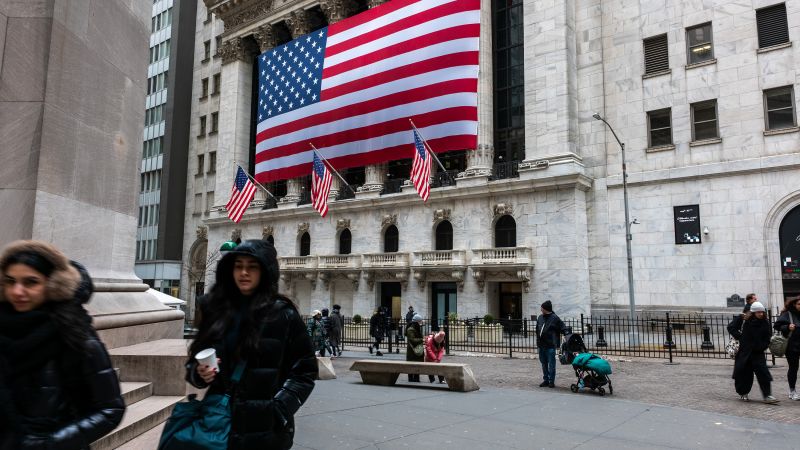
CNN
—
On Friday, U.S. stock markets experienced significant declines following an economic report that indicated growing concerns among American consumers regarding rising prices and the potential inflationary impact of President Donald Trump’s tariffs.
The Dow Jones Industrial Average plummeted by 748 points, equivalent to a 1.7% decrease. Similarly, the S&P 500 also dropped by 1.7%, while the Nasdaq Composite fell by 2.2%. This marked the second consecutive day of decline for the Dow, which has decreased around 1,200 points over Thursday and Friday.
According to the latest survey from the University of Michigan, released on Friday, U.S. consumer sentiment fell for the second month in a row in February, showing a sharp 10% decrease from January. This decline was double the initial estimate reported earlier in the month.
The survey revealed that Americans are increasingly worried about the economy, with concerns primarily stemming from Trump’s tariffs potentially leading to higher prices.
A recent CNN poll, released on Thursday, indicated a growing sense of pessimism regarding price levels: Nearly 62% of U.S. adults believe that Trump is not adequately addressing inflation concerns. The Michigan survey highlighted increased fears of impending inflation among consumers.
Investors are worried that dwindling consumer confidence may result in a decline in consumer spending, which accounts for over two-thirds of the U.S. economy.
While there is currently no clear indication of a recession, recent economic data has shown signs of weakening. In the past year, job growth has slowed as businesses await clarity regarding the Trump administration’s economic policies—especially those related to tariffs, which could significantly impact profitability. Housing data also appears to be faltering, with a report from the National Association of Realtors stating that existing home sales declined by 4.9% in January from the previous month, even as prices reached record highs, further exacerbating the housing affordability crisis in the U.S.
Additionally, retail sales have experienced a downturn recently.
On Thursday, Walmart cautioned that its sales and profit growth would decelerate this year—an unexpected turn for many analysts who anticipated that Walmart’s low prices on essential goods would continue to drive its impressive growth even amid intense inflationary pressures.
The retailer attributed its conservative growth predictions to consumer anxieties regarding price increases and tariffs. This sentiment was echoed in Monday’s University of Michigan survey, which indicated that concerns about tariffs have affected Americans’ views on prices: inflation expectations for the coming year surged to 4.3%, an increase of a full percentage point from January, marking the highest level since November 2023.
Stocks were also pressured by UnitedHealth, a major component of the Dow, which dropped by 7% following a Wall Street Journal report indicating that the U.S. Department of Justice is investigating the company regarding its Medicaid billing practices. UnitedHealth strongly refuted the Journal’s claims.
Despite the downturn, stock prices remain near their all-time highs, with the S&P 500 reaching a record high on Wednesday before experiencing a slight retreat on Thursday.
This report was contributed to by CNN’s Bryan Mena.









